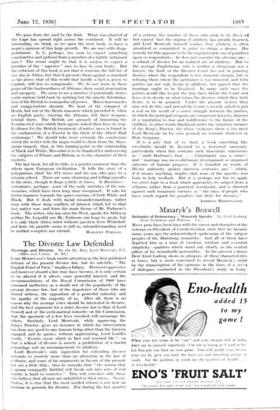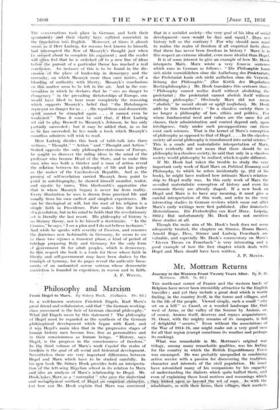Masaryk's' Boswell
Defender of Democracy : Masaryk Speaks. liy Emil Ludwig. (Ivor Nicholson and Watson. 15s. • MANY pens have been busy with the career and character of the veteran ex-President of Czechoslovakia since first he became many years ago the acknowledged spokesman of the subject peoples of the Habsburg monarchy. And all of theta have depicted him as a man of candour, wisdom and- essential simplicity—qualities -which stand out clearly as the central pillars of his remarkable personality. In the present volume Herr Emil Ludwig shows us glimpses of these characteri ;ties at times,- but is more concerned to reveal Masaryk's mind by the transcription of his opinions in the form of a serves of dialogues conducted in the -President's study in !Any. The conversations took place in German, and both their spontatreity • .altd their -charity-, haveSifireted somewhat in the Vranslation into English: MOreover, at times it almoit seems as if Herr Ludwig, for reasons best known to himself, had interrupted the flow of Masaryk's thought .just when
I:e seemed about to complete his argument ; and the reader ..- --
will eften feel that he is switched off to a new line of ideas before -the pursuit of a particular theme has reached a real (.0nel-6;ion. An instance of this is to be found in the dis- cussion: of the place of leadership in democracy and the necessity, on which Masaryk more than once insists, of. a blending of authority with liberty. Masaryk's conclusions on this. matter seem to be left in the air. And in the con- versation in which he declares that he sees no danger to eenuaeracy " in the prevailing dictatorships of Europe, one would have liked to hear more completely the reasoning which _supports Masaryk's belief that " the Habsburgers represent no danger for us . . . the republican and democratic spirit cannot be strangled again . . . it cannot even be weakened." Thus it must be said that, if Herr Ludwig set out to play Boswell to Masaryk's Johnson, he has only Lartially succeeded ; but it may be added that, in so far as he lias succeeded, he has made a book which Masaryk's countless admirers will wish to read.
Herr Ludwig divides this book of table-talk into three sections, " Thought," " Action " and " Thought and Action." Seated: opposite the only philosopher-statesman of Europe, he sought to discover the ruling ideas in the mind of the professor who became Head of the State, and to make this man Who was both a thinker and a Man of action reveal the relation between his philosophy of life and his policy as the: maker of the Czechoslovak Republic. And as the - ; process of self-revelation carried Masaryk from whit to
point in autobiography, he showed himself moralist, realist, and mystic by turns. This blacksmith's apprentice (for , that is where Masaryk began) is never far from reality. Every .•filustration he uses is drawn from practical life and usually from his own earliest and simplest experiences. He can' be theological at will, but the root of his religion is a simple faith in Providence. Fate makes him the leader of areNolution, but in his mind he holds that the revolutionary net is „literally the last resort. His philosophy of history is . no -literary theory, nor is he himself a doctrinaire. " In the Cosriios," he says, - I see a plan and I do not believe in chance." And_while he speaks with severity of Fascism, and censures the doctrines now fashionable in Germany, he seems to see in These two regimes a transient phase, a kind of period of tutelage preparing Italy and Germany for the only form of ge.fernment lit for adult peoples, which is democracy. In this respect the book a tonic for those whose faith in liberty_ and self-government may have been shaken by the triumph of tyranny, for its pages reveal the authentic linea- ments ::of an undaunted serene veteran whose democratic conviction is founded in experience, in reason and in faith.
A. F. WHYTE.























































 Previous page
Previous page